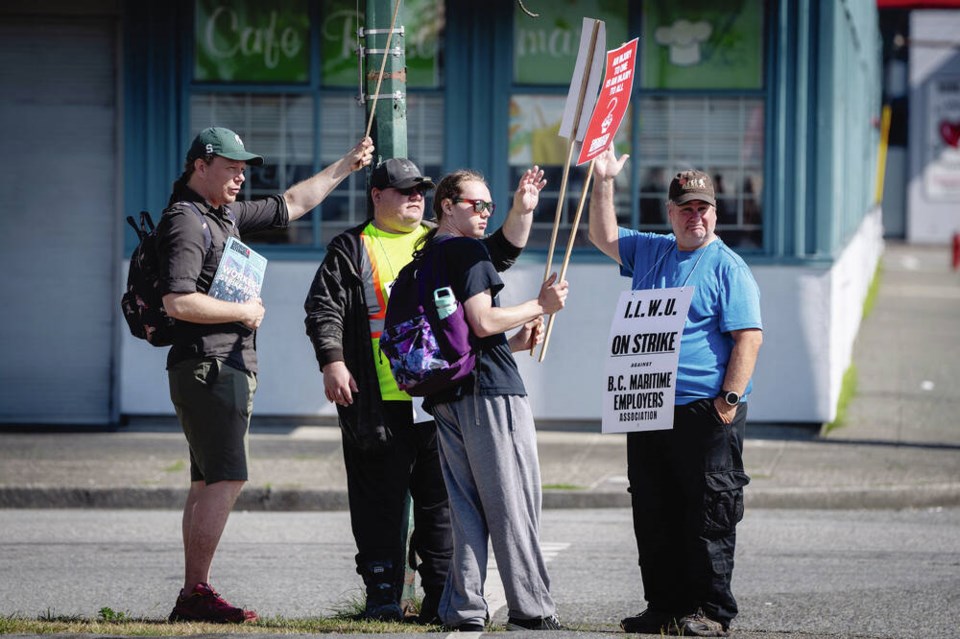Major groups representing businesses across Canada sounded the alarm on Saturday over the potential economic impact of a strike by British Columbia’s port workers.
About 7,400 members of the International Longshore and Warehouse Union Canada walked off the job on Saturday after days of federally mediated talks with the B.C. Maritime Employers Association failed to yield a new labour agreement.
On Friday both the union and employer confirmed the strike would not affect cruise ships docking at Vancouver Island, Vancouver and Prince Rupert. Greater Victoria is in the midst of its annual cruise ship season, which sees huge ships stopping in on their way to or from Alaska. About 330 ship visits are scheduled for Odgen Point this season.
Cruise ships will continue to be serviced during the strike. The employers association said in a statement the exemption was a result of the federal “mediation and conciliation service process.”
Saturday’s walkout triggered almost immediate reaction from the national business community, including the Canadian Chamber of Commerce. “One day is too long for this strike,” deputy leader of government relations Robin Guy said in an interview. Guy said the uncertainty created by the labour dispute at Canada’s busiest ports will hit Canadian families and businesses in the pocket books at a time when inflation has made living and doing business more costly than ever.
“We want this to be resolved as soon as possible. We really do need government actively involved to remedy the strike,” he said. “We need the government to use all the tools in its toolbox to end this dispute.”
The employers association said that on Saturday night, after 33 consecutive hours of talks, negotiators agreed to a pause “to re-charge and re-energize” and are to resume bargaining today.
“Over the course of the past couple of days, the BCMEA has continued to advance proposals and positions in good faith, with the objective of achieving a fair deal at the table,” it said in a statement. “Our Bargaining Committee has made repeated efforts to be flexible and find compromise on key priorities, but regrettably, the parties have yet to be successful in reaching a settlement.”
The union served a 72-hour strike notice on Wednesday; it could not be reached for comment on Saturday’s developments.
The Canadian Federation of Independent Business echoed the Chamber of Commerce’s concerns about the job action.
“A strike could have serious consequences for our economy and our small businesses. Port operations must remain fluid so as not to exacerbate supply chain disruptions and put further pressure on costs, at a time when we are still facing high inflation,” it said in a statement.
At the Maritime Labour Centre in East Vancouver on Saturday, union members gathered and scoured lists posted on outside walls for their picketing assignments.
Striking workers were being dispatched to various port locations, and a small group of ILWU members milled about near the port entrance at Clark and Hastings in East Vancouver on Saturday morning.
The men — wearing placards and buttons depicting a cobra snake and the slogan “will strike if provoked” — all declined to comment on the strike action. They referred all questions to ILWU Canada president Rob Ashton, who couldn’t be reached for comment.
Federal Labour Minister Seamus O’Regan said the two sides continue to negotiate, adding “the best deals for both parties are reached at the table.”
The strike affects about 7,400 terminal cargo loaders and 49 of the province’s waterfront employers at about 30 B.C. ports.
In early June, 99.24 per cent of union membership voted in favour of strike action.
The ILWU did not issue a 72-hour strike notice on June 21,
the earliest possible date for such an action after receiving the authorization vote from its members. That notice came instead on June 28, with the ILWU issuing a statement at the time that accused the employers association of demanding “major concessions” from the union despite “record profits during the COVID-19 pandemic.” The strike notice came nearly three months after the last contract expired on March 30.
The union said it was seeking to protect members from the “erosion” of work stemming from outside contract workers and port automation.
The association says on its website that its industry contributes $2.7 billion annually to Canada’s GDP while handling roughly 16 per cent of the country’s total traded goods, amounting to $180 billion in 2020.
>>> To comment on this article, write a letter to the editor: [email protected]



